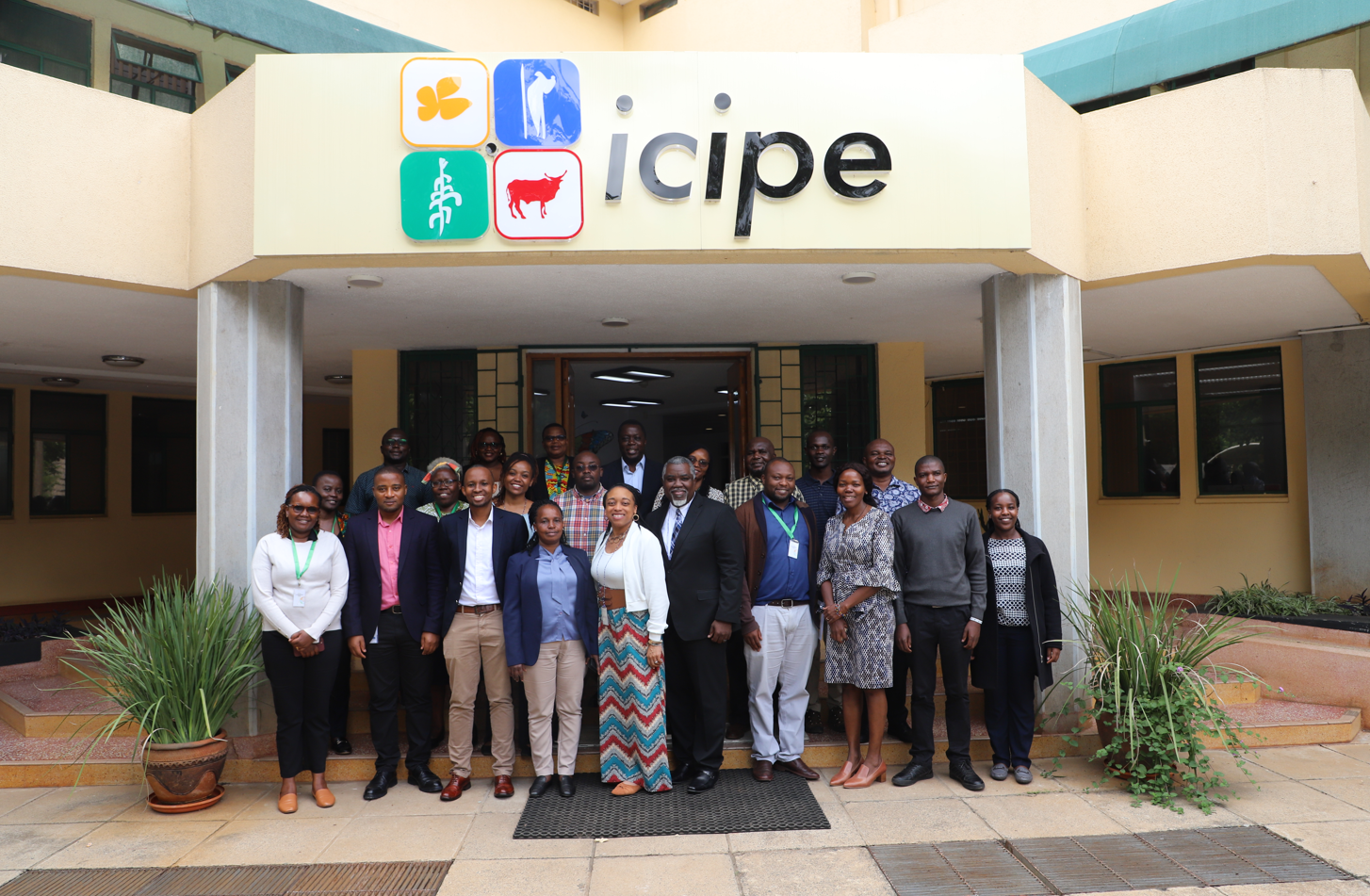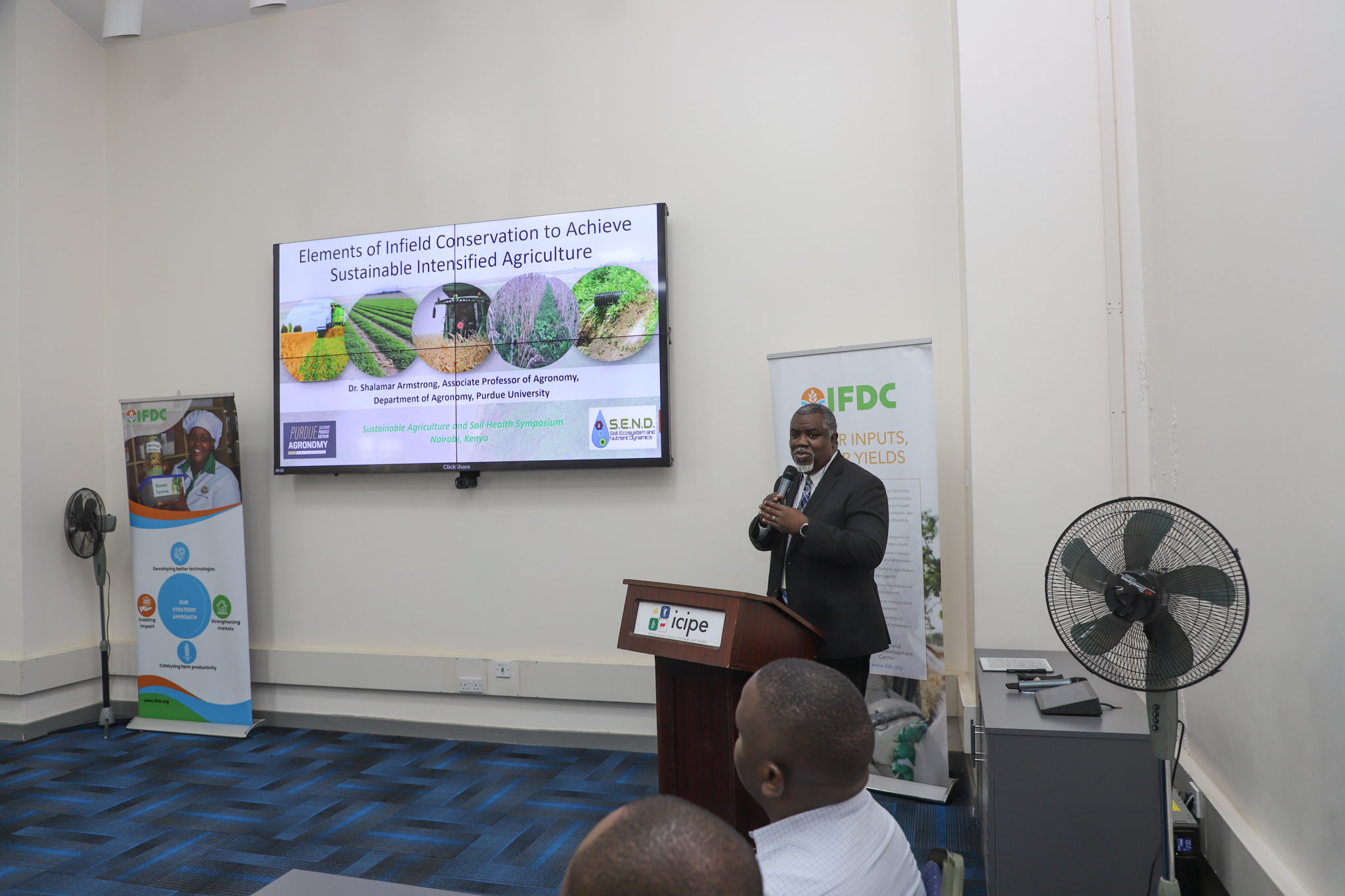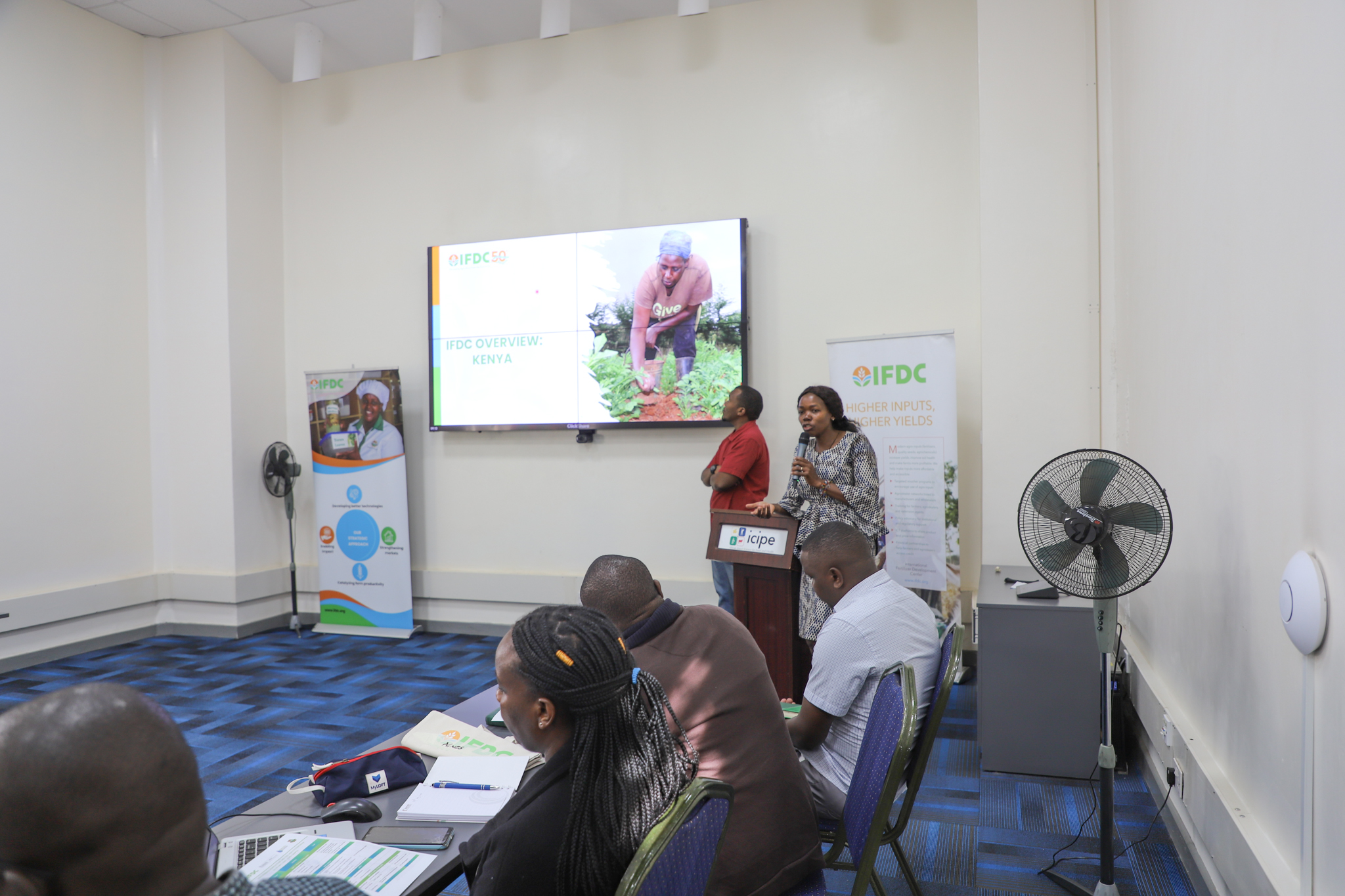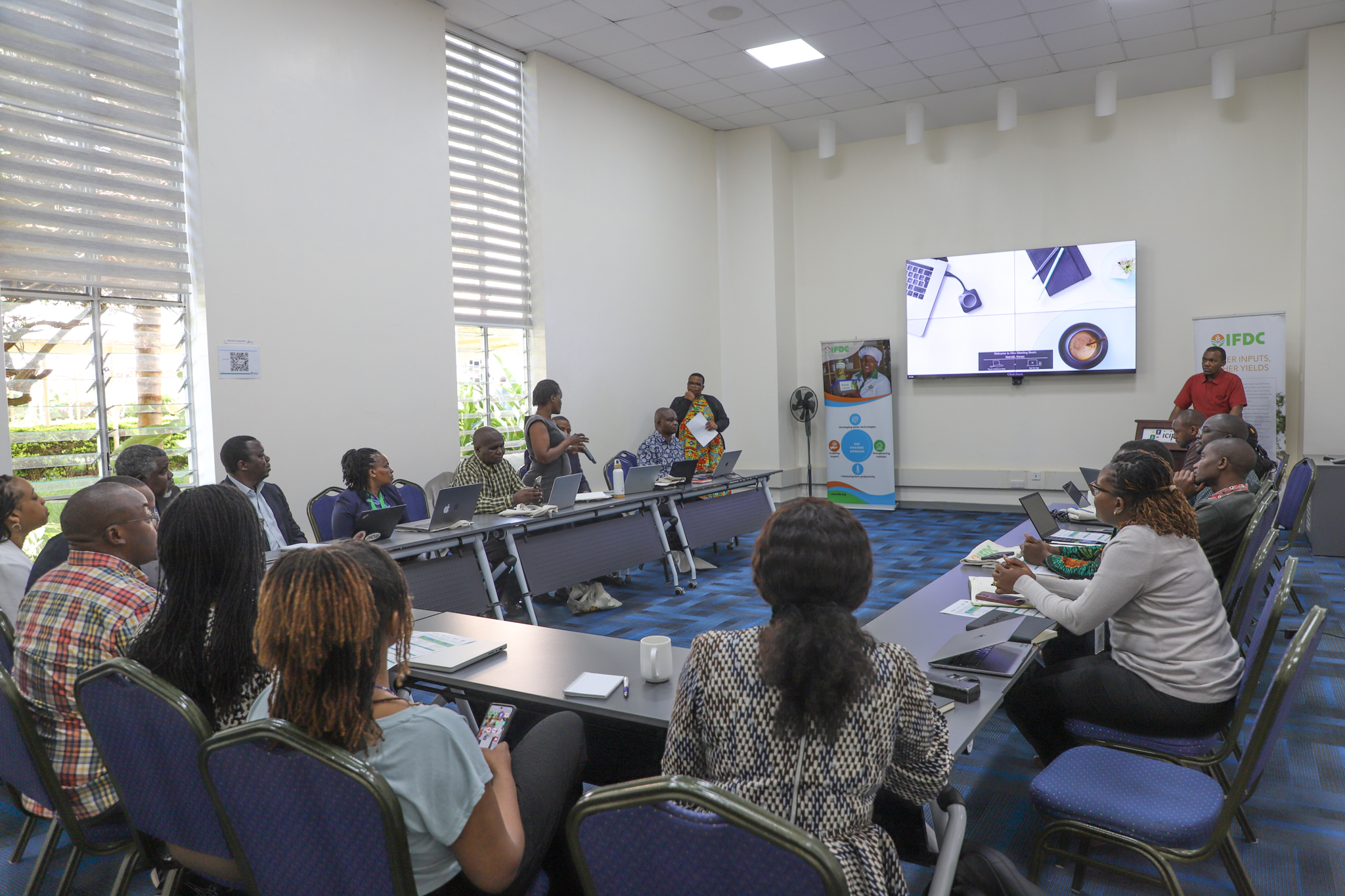
IFDC, in collaboration with Purdue University College of Agriculture and Kenyatta University, hosted a one-day Soil Health and Sustainable Agriculture Symposium at the International Centre of Insect Physiology and Ecology (ICIPE) campus in Nairobi, Kenya. Throughout the May 19 forum, scientists, researchers, and academics explored collaborative opportunities to advance soil health across the continent of Africa.
The symposium brought together experts from IFDC, Purdue University, Kenyatta University, the African Plant Nutrition Institute (APNI), ICIPE, and the Alliance of Bioversity International and the International Center for Tropical Agriculture (CIAT). Over 20 participants engaged in extensive discussions, knowledge-sharing, and the identification of potential areas for joint research and innovation.
“Through partnerships like these, we can co-create a resilient, productive, and sustainable future for agriculture in Africa.”
Dr. Shalamar Armstrong, Associate Professor in Purdue University’s Department of Agronomy and Director of the SEND Lab
Delivering the keynote address, Dr. Shalamar Armstrong, Associate Professor in Purdue University’s Department of Agronomy and Director of the Soil Ecosystem and Nutrient Dynamics (SEND) Lab, underscored the power of science-based conservation agriculture. His presentation, entitled “Elements of Infield Conservation to Achieve Sustainable Intensified Agriculture,” delved into the use of conservation tillage, cover cropping, and biological nitrogen cycling as core strategies to enhance yields while preserving ecosystem health.
Drawing from a 46-year field trial at Purdue, Dr. Armstrong demonstrated how no-till systems increased soil organic carbon and nitrogen in deeper soil layers, and how cover cropping significantly reduced nitrogen losses. He described practices, such as integrating clover into cropping systems, that can cut fertilizer costs and environmental damage while improving soil fertility.

“These practices are not just agronomically effective,” Dr. Armstrong remarked. “They’re economically viable and ecologically sound. That is the essence of sustainable intensified agriculture.”
IFDC Kenya Country Director Bridget Okumu noted the timely nature of the symposium, following the 2024 Africa Fertilizer and Soil Health (AFSH) Summit: “IFDC is actively supporting the Government of Kenya in developing the AFSH Action Plan, which targets tripling domestic fertilizer production and utilization, both organic and inorganic, by 2034,” she stated.
Okumu emphasized the value of strategic partnerships in translating research into practical, scalable solutions that can improve soil health, boost productivity, and enhance climate resilience across farming systems.
Throughout the day, participating institutions exhibited groundbreaking research and innovations. IFDC presented its work on fertilizer-efficient technologies, such as urea deep placement (UDP), fertilizer microdosing, and new products being developed at its pilot fertilizer plant in Alabama.
IFDC Senior Soil Scientist Dr. Caroline Agamala also introduced the Participatory Integrated Planning (PIP) approach – a farmer-centered land management model currently being implemented in Ethiopia after success in Burundi and Uganda.
“PIP places farmers at the center of land management decisions, ensuring that sustainable practices are co-developed and adopted effectively,” Dr. Agamala explained.

Other speakers also contributed actionable insights. Dr. Boaz Waswa, a scientist from CIAT, discussed integrated soil fertility management and site-specific fertilizer recommendations, along with socioeconomic considerations such as gender and nutrition.
ICIPE Post-Doctoral Fellow Dr. Dennis Beesigamukama showcased the use of black soldier fly frass fertilizer (BSFFF), an innovative, high-nutrient organic fertilizer derived from insect farming. He presented data indicating that BSFFF application can increase maize yields by 27% and legume yields by up to 73%.
“BSFFF is a game changer,” Dr. Beesigamukama declared. “It supports a circular economy, promotes soil biodiversity, and suppresses pests naturally.”
Dr. Samuel Njoroge, a scientist from APNI, shared updates on projects promoting precision nutrient management and the co-creation of farmer-led agronomic solutions in Kenya. He highlighted initiatives such as the Nutrient-Catalyzed Agricultural Transformation (NUTCAT) project and APNI’s ongoing support for African researchers through scholarships and conferences.
Kenyatta University doctoral student Michael Sakha presented research on specific types of fungi in mixed cropping systems in Makueni County, showing how diversified cropping can foster microbial diversity and enhance soil structure in semi-arid regions.

In the final session, participants turned their focus to the future, investigating concrete ways to collaborate with Purdue University. Ideas included co-supervising graduate students, joint trials of innovative inputs such as BSFFF and UDP in different agroecologies, co-development of nutrient decision-support tools, and exchange programs between African universities and Purdue University.
Participants also expressed strong interest in jointly designing soil science curricula and forming research consortia for large-scale grant applications.
Dr. Armstrong concluded the symposium by reaffirming the value of partnerships in agricultural innovation. “The soil is our common ground: scientifically, socially, and economically,” he said. “Through partnerships like these, we can co-create a resilient, productive, and sustainable future for agriculture in Africa.”
Even as participants departed, they shared a sense of momentum and commitment to continue the conversation and turn ideas into impactful action. The symposium not only provided a platform for knowledge exchange but also laid the foundation for long-term collaborations that will strengthen Africa’s soil health, food security, and environmental sustainability.




